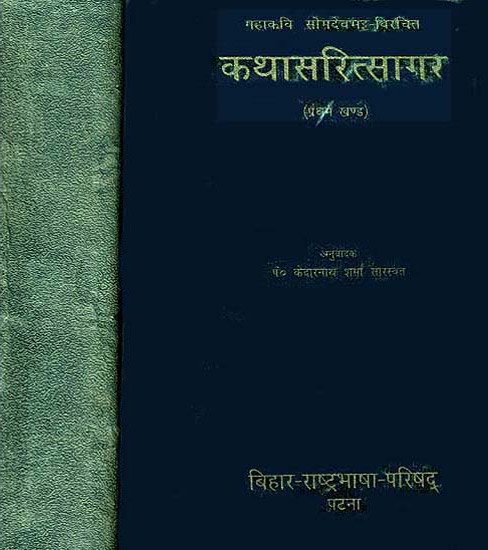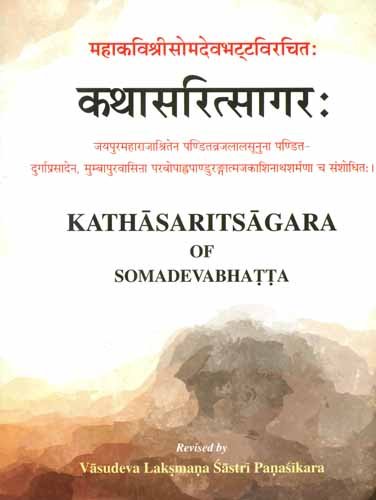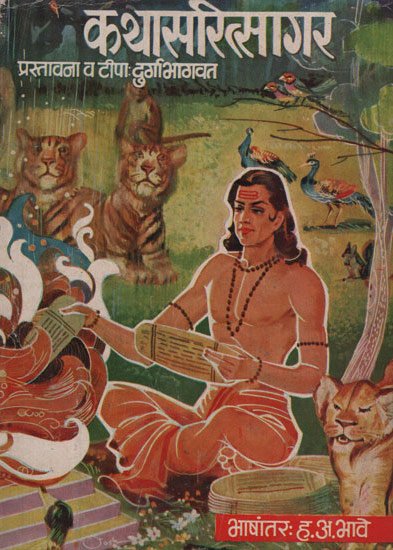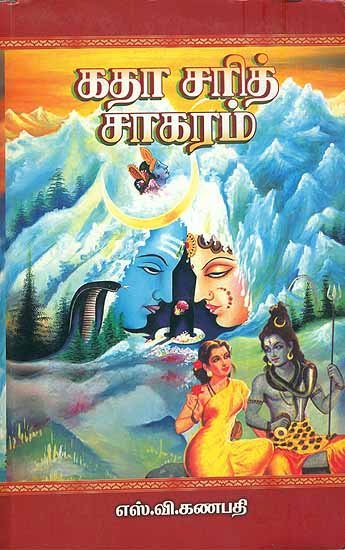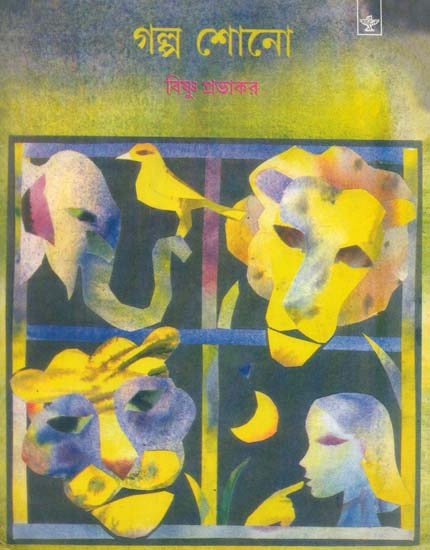Kathasaritsagara [sanskrit]
by C. H. Tawney | 2014 | 226,424 words | ISBN-13: 9789350501351
The Sanskrit edition of the Kathasaritsagara referencing the English translation and grammatical analysis. Written by Somadeva and dating from the 12th century, the Kathasaritsagara (or Katha-sarit-sagara) represents an epic legend narrating the adventures of Naravahanadatta as he strives to become the destined emperor of the Vidyadharas. Alternative titles: (Kathāsaritsāgara, कथासरित्सागर, Kathā-sarit-sāgara)
Verse 9.6.241
अत्रान्तरे स्वनगरे दमयन्ती सरोवरम् ।
भीमात्मजा जलक्रीडाहेतोरवततार सा ॥ २४० ॥
atrāntare svanagare damayantī sarovaram |
bhīmātmajā jalakrīḍāhetoravatatāra sā || 240 ||
The English translation of Kathasaritsagara Verse 9.6.241 is contained in the book The Ocean of Story by C.H. Tawney. This book is available online or you could buy the latest edition:
Read online Buy now! The English translation by C.H. Tawney (2014)
Glossary of Sanskrit terms
Note: This extracts Sanskrit terms and links to English definitions from the glossary, based on an experimental segmentation of verse (9.6.241). Some terms could be superfluous while some might not be mentioned. Click on the word to show English definitions.
Atra, Tara, Tari, Svanagara, Damayanti, Damayat, Sarovara, Bhima, Jalakrida, Ahetu, Avatata, Ara,
Analysis of Sanskrit grammar
Note: this is an experimental feature and only shows the first possible analysis of the Sanskrit text (Kathasaritsagara Verse 9.6.241). If the system was successful in segmenting the sentence, you will see of which words it is made up of, generally consisting of Nouns, Pronouns, Verbs, Participles and Indeclinables. Click on the link to show all possible derivations of the word.
- Line 1: “atrāntare svanagare damayantī sarovaram ”
- atrān -
-
atra (noun, masculine)[accusative plural]
- tare -
-
tara (noun, masculine)[locative single]tara (noun, neuter)[nominative dual], [vocative dual], [accusative dual], [locative single]tarā (noun, feminine)[nominative dual], [vocative single], [vocative dual], [accusative dual]tari (noun, feminine)[vocative single]
- svanagare -
-
svanagara (noun, neuter)[nominative dual], [vocative dual], [accusative dual], [locative single]
- damayantī -
-
damayantī (noun, feminine)[compound], [nominative single]√dam -> damayantī (participle, feminine)[compound from √dam]√dam -> damayat (participle, neuter)[nominative dual from √dam], [vocative dual from √dam], [accusative dual from √dam]√dam -> damayantī (participle, feminine)[nominative single from √dam]
- sarovaram -
-
sarovara (noun, neuter)[adverb], [nominative single], [accusative single]
- Line 2: “bhīmātmajā jalakrīḍāhetoravatatāra sā ”
- bhīmāt -
-
bhīma (noun, masculine)[adverb], [ablative single]bhīma (noun, neuter)[adverb], [ablative single]
- ma -
-
ma (noun, masculine)[compound], [vocative single]ma (noun, neuter)[compound], [vocative single]
- jā* -
-
ja (noun, masculine)[nominative plural], [vocative plural]jā (noun, feminine)[nominative plural], [vocative plural], [accusative plural]
- jalakrīḍā -
-
jalakrīḍā (noun, feminine)[nominative single]
- ahetor -
-
ahetu (noun, masculine)[ablative single], [genitive single]
- avatatā -
-
avatata (noun, masculine)[compound], [vocative single]avatata (noun, neuter)[compound], [vocative single]avatatā (noun, feminine)[nominative single]
- ara -
-
ara (noun, masculine)[compound], [vocative single]ara (noun, neuter)[compound], [vocative single]√ṛ (verb class 1)[perfect active first single], [perfect active second plural], [perfect active third single]√ṛ (verb class 3)[perfect active first single], [perfect active second plural], [perfect active third single]√ṛ (verb class 5)[perfect active first single], [perfect active second plural], [perfect active third single]
- sā -
-
sā (indeclinable correlative)[indeclinable correlative]sā (noun, feminine)[nominative single]
Other editions:
Also see the following editions of the Sanskrit text or (alternative) English translations of the Kathasaritsagara Verse 9.6.241
Kathasaritsagar
by Kedarnath Sharma Saraswat (2005)
The Only Edition with the Sanskrit Text and its Hindi Translation (An Old and Rare Book) Set of 3 Vol.
Buy now!
Kathasaritsagara of Somadeva Bhatta (Sanskrit Text Only)
by Vasudeva Laksmana Sastri (2013)
Katha Sarit Sagar in Marathi
by H. A Bhave (1995)
Set of 5 Volumes; Published by Varada Books, Pune. 2256 pages (Throughout B/W Illustrations).
Buy now!
Katha Sarit Sagara (Tamil)
by S. V. Ganapati (எஸ். வி. கணபதி) (2014)
[கதா சரித் சாகரம்] Published by Alliance Publications.
Buy now!
Galpa Shono
by Abhijit Chattopadhyay (2014)
[গল্প শোনো] Galpa Shono: Bengali Translation of 'Suno Kahani From Katha Sarit Sagar'; 9788126015436; Published by Sahitya Akademi, Delhi.
Buy now!Preview of verse 9.6.241 in Bengali sript:
অত্রান্তরে স্বনগরে দমযন্তী সরোবরম্ ।
ভীমাত্মজা জলক্রীডাহেতোরবততার সা ॥ ২৪০ ॥
![Kathasaritsagara [sanskrit] - book cover](/uploads/a/Katha-Sarit-Sagara.jpg)
